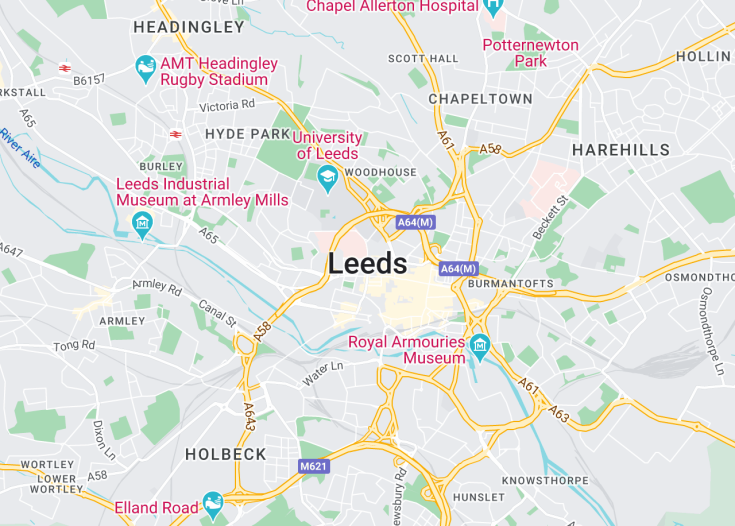Leeds, situated in the heart of the United Kingdom, epitomizes a harmonious blend of historical grandeur and contemporary vibrancy. This bustling city in West Yorkshire boasts a rich tapestry of Victorian architecture, thriving arts scenes, and verdant parks. Renowned for its cultural festivals and extensive retail opportunities, Leeds offers a dynamic backdrop for an enriching visit. Its illustrious universities and vibrant culinary scene enhance its appeal as a premier travel destination, providing a unique window into both past and present British life.
Before you visit Leeds, ensure to check the calendar for festivals and events; the city is famous for its lively celebrations and you wouldn’t want to miss out.
For a truly local experience, explore the historic Kirkgate Market, one of the largest indoor markets in Europe, offering a variety of foods, goods, and crafts.
Top things to do & see in Leeds
Select the following sights and activities to discover best tickets and tours available in Leeds.
Leeds: The Vibrant Heart of West Yorkshire
| Country | England (United Kingdom) |
| Time in Leeds | GMT+0 |
| Language spoken | English |
| Population | 800,000 (Based on the most recent census) |
| Currency | Pound Sterling (£, GBP) |
| Airports | Leeds Bradford Airport (7 mi / 11 km). |
Leeds, a bustling city in West Yorkshire, northern England, boasts a rich industrial heritage and a thriving cultural scene. Originally a small manorial borough in the 13th century, Leeds expanded rapidly during the Industrial Revolution, becoming a major mill town along with centers for wool production, iron foundries, and the printing press. Modern-day Leeds is known for its diverse economy and vibrant nightlife. The city is a hub for financial and legal services in the UK, rivaling London.
Where is Leeds?
Leeds is situated along the River Aire in Northern England and is an integral part of the United Kingdom’s West Yorkshire urban area.
Distances:
| Route | Distance by car | Time by car |
|---|---|---|
| London to Leeds | 195 miles | 3h 30min |
| Manchester to Leeds | 44 miles | 1h 10min |
| Liverpool to Leeds | 70 miles | 1h 30min |
What is Leeds famous for?
Leeds is renowned for its rich sporting heritage, hosting teams like the Leeds United Football Club. The city is also famous for its cultural festivals, including the annual Leeds International Film Festival.
History
Prehistoric to Medieval Times (up to the 16th century)
Leeds began as a small manorial borough in the 13th century, and by the time it was mentioned in the Domesday Book in 1086, it was already a modest market town. However, archaeological evidence indicates that the area was settled as far back as the 5th millennium BC. By the medieval period, Leeds was under the lordship of the de Lacy family whose influence helped the town grow modestly in importance, focusing on agricultural and handcrafting pursuits.
The Industrial Revolution (18th and 19th centuries)
Leeds underwent transformational change during the Industrial Revolution, shifting from a small manorial borough to a major mill town. Textile mills, foundries, and printing presses became the backbone of the city’s economy, fuelled by the availability of coal and iron ore from its surrounding areas. The completion of the Leeds and Liverpool Canal in 1816 and the arrival of the railway in 1834 significantly enhanced its connectivity, boosting commerce and increasing the population exponentially.
20th Century to Present
In the 20th century, Leeds continued to prosper as a commercial hub, particularly in the fields of print, retail, and legal services. Post World War II, it saw extensive redevelopment, particularly in the city center which turned it into one of the UK’s key financial and legal centers. The 21st century brought urban regeneration projects that revitalized industrial sites and expanded the city’s retail and commercial spaces, securing Leeds’ reputation as a vibrant, dynamic city. The opening of the Trinity Leeds shopping center in 2013 and the First Direct Arena point to its ongoing development and urban modernization.
Visit Leeds
What to see and do in Leeds, England (United Kingdom)
Leeds is a city bursting with cultural heritage and modern attractions. Visitors should not miss the Royal Armouries Museum, hosting the UK’s national collection of arms and armour. Art enthusiasts will enjoy the Leeds Art Gallery and the adjoining Henry Moore Institute. For shopping, the Victoria Quarter offers a blend of high-end shops within an aesthetically stunning setting, and calligraphy enthusiasts must visit the Leeds Kirkgate Market, one of the largest indoor markets in Europe. Outdoors, Roundhay Park provides extensive parklands and lakes, ideal for picnics and leisurely walks.
Festive Leeds
Leeds is host to numerous annual events that celebrate its cultural diversity and artistic heritage. Notable events include the Leeds International Film Festival typically held in November, and the Leeds West Indian Carnival, one of the oldest Caribbean carnivals in Europe, erupting every August Bank Holiday. The Leeds Festival, a massive music festival, also takes place at the end of August, featuring top-tier international artists.
Best time to visit Leeds
The best time to visit Leeds is during the late spring to early autumn, from May to September, when the weather is most pleasant. This period provides an ideal climate for exploring the outdoors, attending festivals, and enjoying the vibrant city life.
Is Leeds worth visiting?
Leeds is certainly worth a visit. With its rich history, diverse cultural offerings and dynamic atmosphere, the city offers something for everyone. The blend of historical architecture with modern urban regeneration provides a unique urban experience, while the thriving arts scene and numerous shopping opportunities cater to all interests. Whether you’re looking for history, entertainment, or just a lively city break, Leeds will not disappoint.









